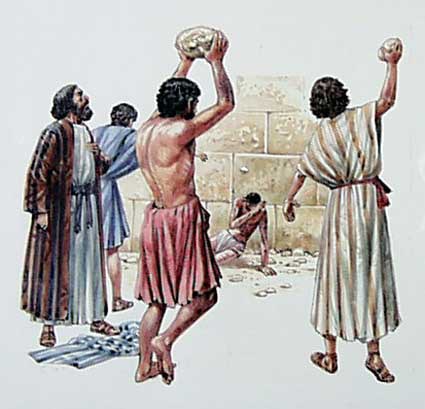 Articles in this section are from the past 6 to 12 months,
Articles in this section are from the past 6 to 12 months,
I am grateful to Christ Jesus our Lord, who has strengthened me, because he judged me faithful and appointed me to His service, even though I was formerly a blasphemer, a persecutor, and a man of violence. I Timothy 1.12-13 NRSV
T his is the beginning of the passage in which Paul says “It is a trustworthy statement deserving full acceptance that Christ Jesus came into the world to save sinners, among whom I am the worst.” This statement would not carry nearly so much weight without Paul’s description of himself before his encounter with Jesus on the Damascus road. We know from the book of Acts that Paul (known by his birth-name Saul) was present to give sanction to the stoning of Stephen, then continued to pursue a violent, targeted campaign against Christians (Acts 7.60-8.1; 9.1). We know that he sought to expand this program of violence beyond Judea and into Syria (9.2). We know how violent and extreme his actions were from his own description of them in the verses above.
his is the beginning of the passage in which Paul says “It is a trustworthy statement deserving full acceptance that Christ Jesus came into the world to save sinners, among whom I am the worst.” This statement would not carry nearly so much weight without Paul’s description of himself before his encounter with Jesus on the Damascus road. We know from the book of Acts that Paul (known by his birth-name Saul) was present to give sanction to the stoning of Stephen, then continued to pursue a violent, targeted campaign against Christians (Acts 7.60-8.1; 9.1). We know that he sought to expand this program of violence beyond Judea and into Syria (9.2). We know how violent and extreme his actions were from his own description of them in the verses above.
The word “persecute” means to stalk, to hunt down. That is pretty vivid, but the really graphic word is the one translated “man of violence.” Reinecker & Rogers in the Linguistic Key to the Greek New Testament (Zondervan, 1976) describe it this way:
…a sadist, a violent person….one who deliberately and contemptuously mistreats another person for the sake of hurting and deliberately humiliating that person. It speaks of treatment which is calculated to publicly insult and openly humiliate…. (p.617).
There is an element of cruelty, of hatred, of evil in all this that suggests the pathological. The monomaniacal intensity of Paul’s (Saul’s) relentless pursuit of Christians calls into question his character at that time. This seems to denote something more than religious fervor – it suggests heartlessness. Keeping in mind that these are Paul’s own words to describe himself, we fully understand his sincerity when he tells us, essentially, “If I can be saved, anyone can be saved” (I Timothy 1.15-16).
This is important to remember, because it is so easy to think of others, and at times to think of ourselves, as unredeemable. This is also important because we see that the elements that go into making the vices of an unredeemed life, can become the building blocks of virtue.
I think of the single-mindedness, focus, resolve, and determination it took to be such a rabid persecutor, and then I think of the single-mindedness, focus, resolve, and determination it took to survive the beatings, the stonings, the arrests, the mob-violence, the shipwrecks, the starvation, the stress.
I think of a moment when Paul, Barnabas, and Peter were at Antioch as some from James came to Jerusalem demanding that Jewish Christians not fraternize with Gentile Christians (Galatians 2.11-21). Peter caved in. Even Barnabas caved in. But Paul stood firm. Paul did not back down. Paul stood toe-to-toe, and face-to-face with Peter and publicly rebuked him for his hypocrisy. Barnabas, “the encouragement guy” was not prepared to be the “face-down-an-apostle” guy. Paul, the past “pit-bull” was.*
My point is – or rather Paul’s point is that no life is unredeemable, and that the raw material of any person’s life can become the building blocks, in the hands of the Holy Spirit, of a holy life.
*No offense to pit-bulls, or their owners. All the pit-bulls I know personally are very sweet, loving dogs.
For God so loved the world, that He gave His only Son, that whoever believes in Him should not perish but have eternal life. John 3.16
Love is patient and kind; love does not envy or boast; it is not arrogant or rude. It does not insist on its own way; it is not irritable and does not keep a record of wrongdoing; it does not rejoice at wrongdoing, but rejoices in the truth. Love bears all things, believes all things, hopes all things, endures all things. I Corinthians 13.4-7
 Readers of the Bible, even casual ones, know the verses above and love them. Even non-believers are affected by the depth, the poetry, the sublimity of them. I had a student once, an avowed atheist (not an agnostic, he made clear) who had I Corinthians 13.7 tattooed on his right bicep in Greek. I asked him why, and he replied that the words are beautiful, and true. He is right. They are.
Readers of the Bible, even casual ones, know the verses above and love them. Even non-believers are affected by the depth, the poetry, the sublimity of them. I had a student once, an avowed atheist (not an agnostic, he made clear) who had I Corinthians 13.7 tattooed on his right bicep in Greek. I asked him why, and he replied that the words are beautiful, and true. He is right. They are.
He took these beautiful, true words to use as a mantra, a talisman, a slogan, a decoration for his body the way my mother used to buy decorations for the house at Home-Interiors parties. I think we are, at times, guilty of the same reduction. We like to see these words on posters at football games, read as liturgy in wedding ceremonies, embroidered on quilted Bible-covers. Familiarity with them has not bred contempt, but cliché.
We treat these verses the way we treat Norman Rockwell paintings or poems by Robert Frost, enjoying the warmth and nostalgia they induce the way we enjoy comfort-food, completely ignoring the darkness they contain. But isn’t such a response a form of self-gratification? And isn’t indulgence in self-gratification a rejection of the essential truth about love communicated in these verses.
The subtext of the verses above is that Love is hard. Love costs. Love hurts. Because God loved us Jesus had to die. Being patient assumes that patience will be tried. Keeping no record of wrongs assumes that there will be a laundry list of wrongs to be forgotten. Bearing all things assumes there will be much to bear. Enduring all things assumes there will be much to endure. And yet we are persistently surprised when loving relationships hurt, or cost, or require sacrifice and effort.
And often we become resentful – resentful of the one we love, resentful of Love, resentful of God – because He is Love, and because He has allowed things to be thus. Maybe we would never admit such resentment to others – even to ourselves – but our bitterness, our cynicism, our negativity are clearly evident to all. This resentment is not only evident, but contagious.
Such disappointment with each other and with God is immature. It is nothing more and nothing less than childishness – the product of selective listening, or not listening at all. “If you clean your room you may have a cookie,” our Father has said, and we only hear the part about the cookie. God has said that to love is to sacrifice, to love is to hurt, to love is to endure. He has told us with words and with deeds because He has endured, and hurt, and sacrificed His very Self.
Indeed, if we really listen, we understand that this is not the subtext of the verses above but the text itself - the very thing that gives love value. What other quality has such strength, such power to last, to overcome? Only love.
Faith, Hope and Love – these three are eternal, but the greatest of these is Love.
I Corinthians 13.13
God, after He spoke long ago to the fathers and the prophets in many portions and in many ways, in these last days he has spoken to us in His Son whom He appointed heir of all things, through whom also He made the world. And He is the radiance of His glory, and the exact representation of His nature, and upholds all things by the word of His power. When he made purification of sins, he sat down at the right hand of the Majesty on high. Hebrews 1.1-3 NASB
 When I was eight my dad took me to the Cabell County Public Library, a beautiful old Carnegie building on 5th Avenue in Huntington, West Virginia, and I got my first library card. I checked out two books, a biography of Robert E. Lee, and a biography of Lincoln. I don’t recall the authors of either. I didn’t finish the Lee biography, it was extremely dull (the book, never the man), but finished the Lincoln. It was part of the Landmark series of biographies for young readers and I read it through four or five times before having to return it two weeks later. That started me collecting biographies about Lincoln. There are other figures I find so fascinating that I collect their biographies as well: George Washington, Abigail Adams, Crazy Horse, Kit Carson, Joshua Lawrence Chamberlin, Dwight D. Eisenhower.
When I was eight my dad took me to the Cabell County Public Library, a beautiful old Carnegie building on 5th Avenue in Huntington, West Virginia, and I got my first library card. I checked out two books, a biography of Robert E. Lee, and a biography of Lincoln. I don’t recall the authors of either. I didn’t finish the Lee biography, it was extremely dull (the book, never the man), but finished the Lincoln. It was part of the Landmark series of biographies for young readers and I read it through four or five times before having to return it two weeks later. That started me collecting biographies about Lincoln. There are other figures I find so fascinating that I collect their biographies as well: George Washington, Abigail Adams, Crazy Horse, Kit Carson, Joshua Lawrence Chamberlin, Dwight D. Eisenhower.
After reading three or four good biographies of a person you pretty well know all the facts. After that the critical biographies fascinate and illuminate. I spent a month absorbed by Doris Kearns Goodwin’s Team of Rivals, found myself wrestling with Gary Wills’ Lincoln at Gettysburg, and took many notes while reading Douglas L Wilson’s Lincoln’s Sword. I am always looking out for a new take, a new angle, a new insight but still go back and read the good, standard biographies. It is like spending time with a friend.
I think of the New Testament this way. Everything is about one person, Jesus. We begin with four biographies. We follow with a history of His disciples telling His story to the world. The rest of the New Testament consists of His disciples explaining what Jesus’ life means.
I believe we are supposed to read the New Testament this way. The passage above states that the way God communicates to us now is “in His Son.” Jesus is God’s message. The New Testament is given to share Jesus. If we know Jesus we know God.
The disciple does not approach the New Testament the way the Pharisees approached the Old Testament. They came to the text in much the same way a post-modern literary critic might, or a strict-constructionist constitutional lawyer –trying to see the text in a vacuum, shorn from any authorial intent - and so they were always missing the point. As a young man I was trained, at times, to use the New Testament this way – to proof text, or better still – to build elaborate arguments that had no connection the major themes of Jesus’ teaching but which proved beyond a doubt that one should tow the party line.
I am convinced now that everything is about Jesus. Everything. If we cannot connect our assertions to Jesus, our assertions are false. We could go to I John or Colossians 2 to further our discussion, but all is contained in the three verses above. All creation is from Jesus. The Universe continues because of Jesus. Everything we know about God we know through Jesus. Our salvation is wholly dependent upon Jesus.
Jesus is everything. When we forget that, we stop being disciples and may become Pharisees.
Turn to me, be gracious to me; Oh grant strength to your servant, and save the son of your handmaid. Psalm 86.16
O Lord, surely I am your servant, the son of your handmaid…Psalm 116.16
Behold I was brought forth in iniquity, and in sin my mother conceived me. Psalm 51.5
 David is, perhaps, the most accomplished fighting man in history. He was unsurpassed at hand to hand combat. He successfully led a small, highly trained unit to protect a border against large armies. As a general he led an army in the field to a succession of victories. As a king he planned successful campaigns. David is clearly, I believe, the greatest poet in history. His psalms have no parallel in literature, ancient or modern, for their unflinching honesty and grace of expression. In these psalms, David, the warrior-king describes himself as a baby (Psalm 131), as a little lamb (Psalm 23). David the Mighty knows his relationship with God is one of parent to child, shepherd to lamb. He wholly depends on God as caregiver, and treasures above all other blessings the presence of God (Psalm 51.11).
David is, perhaps, the most accomplished fighting man in history. He was unsurpassed at hand to hand combat. He successfully led a small, highly trained unit to protect a border against large armies. As a general he led an army in the field to a succession of victories. As a king he planned successful campaigns. David is clearly, I believe, the greatest poet in history. His psalms have no parallel in literature, ancient or modern, for their unflinching honesty and grace of expression. In these psalms, David, the warrior-king describes himself as a baby (Psalm 131), as a little lamb (Psalm 23). David the Mighty knows his relationship with God is one of parent to child, shepherd to lamb. He wholly depends on God as caregiver, and treasures above all other blessings the presence of God (Psalm 51.11).
But he speaks so little of his own parents. From I Samuel we know that his father is named Jesse, lives in Bethlehem, and has a slew of tall, broad-shouldered boys. We know that David is the baby of the bunch. From Ruth we learn much about his great grand-parents, and from Joshua we know about his great-great grandmother Rahab. But of his mother we know nearly nothing – not even her name.
The only references we have of her are from the three psalms cited above. In two of them David refers to his mother as God’s “handmaid.” In one he claims that his mother sinned in conceiving him. These references present some intriguing questions. Is David reporting the facts or speaking figuratively? How can both be true? If only one assertion is true, which is it? Was David’s mother God’s handmaid, or a promiscuous woman?
David often speaks figuratively in the Psalms. “The LORD is my Shepherd,” (Psalm 23.1) is the best known of hundreds he uses. Psalm 51, his hymn of repentance after sinning with/against Bathsheba is written with such heightened emotion, such vigorous humility that he could be belittling himself by belittling his conception. It could be a way of saying “I have been bad from the beginning.” But one wonders if in a hymn meant to be sung publicly (see the superscription) David would be so cavalier with his mother’s reputation.
Then again, the two references to his mother as God’s “handmaid” may just be a way of describing himself as a servant of God, and the son of a servant. But again, why mention his mother, not his father, if she were not truly known to be a devoted servant of God?
And must we assume that both could not be true? Regardless of the circumstances of David’s conception, could not his mother subsequently have been a faithful servant of God, having been forgiven? Of course she could. Isn’t that the very status David seeks in Psalm 51? Could we not call Paul a persecutor and a saint and be right on both counts? He certainly describes himself this way (I Timothy 1.12-17).
We do not know this “handmaid’s” tale, although the few details we have are intriguing. We do know our own stories though. We know whether or not we have been forgiven. And we know forgiveness is offered, whatever we have done, if we repent.
 If you were in medical school what specialization would you pursue? It is not an easy question. With physicians putting in longer hours, paying ever escalating insurance premiums, and sinking in a thickening swamp of bureaucracy, choosing the right specialty might make the difference between an enriching quality of life, and a barely tenable one. I’ve heard from more than one budding doctor of medicine that ObGyn is definitely out - dermatology is the way to go. I don’t know if this is, indeed, the specialty that promises the best life for an MD, I’ll leave all comment on that issue to John Brady.
If you were in medical school what specialization would you pursue? It is not an easy question. With physicians putting in longer hours, paying ever escalating insurance premiums, and sinking in a thickening swamp of bureaucracy, choosing the right specialty might make the difference between an enriching quality of life, and a barely tenable one. I’ve heard from more than one budding doctor of medicine that ObGyn is definitely out - dermatology is the way to go. I don’t know if this is, indeed, the specialty that promises the best life for an MD, I’ll leave all comment on that issue to John Brady.
I do know that Doctors have a mission, a responsibility to heal, and take the oath of Hippocrates to that effect. I know that many of us owe our very lives to Dr. Brady, and others of his profession.
“Physician” always ranks high on the list of most trusted professions. “IRS Agent” does not. In ancient times, in fact until recently, doctors knew very little about why we were sick, and what would make us well – but people still loved, respected, and obeyed their doctors. In Jesus’ day, tax collectors were not respectable civil servants, but private contractors who made most of their income by loan sharking. They were often the associates of the criminal class.
And yet we find Jesus passing by the tax office, and saying to the man behind the desk “Follow me,” (Matthew 9.10). Surprisingly, the man follows. That man’s name was Matthew, and he became an apostle, and the author of the very Gospel we are referencing. He is writing about his own conversion. Matthew wants to share Jesus with his associates, and he gives a dinner so they can all meet him. These associates are described by Matthew, himself, as “tax gatherers and sinners.” Jesus has already given the Sermon on the Mount, and performed many well-known miracles. He is known to be a man of God. And so the Pharisees, representing the moral majority, demand to know why he has blundered so. Jesus’ response is immediate, unapologetic, and unequivocal:
It is not those who are well who need a physician, but those who are sick. Go and learn what this means: “I desire mercy and not sacrifice,” (Hosea 6.6). I did not come to call the righteous, but sinners.
I am quick to take pleasure in each time Jesus sets the Pharisees to rights, grinning a self-satisfied grin right through what he is saying to me. I am no more ready to share Jesus with “the tax-gatherers and sinners” than they were. I am if “sinners” means “nice folks who are theologically misinformed” - or perhaps, “respectable unbelievers.” But if “sinners” includes the subset of criminals and fringe-types Paul describes in I Corinthians 6.9-11, or the kind of seamy individuals that gathered around Matthew’s table, I have to admit, I’m closer to the Pharisees’ view of things, than Jesus’.
Which, of course, is an admission of guilt.
We are commissioned to share Jesus. It is a sacred responsibility. To spend the bulk of our time and energy on ourselves, and not on the lost, is applying intensive care to the well, and a betrayal of the most basic mission of Jesus.

